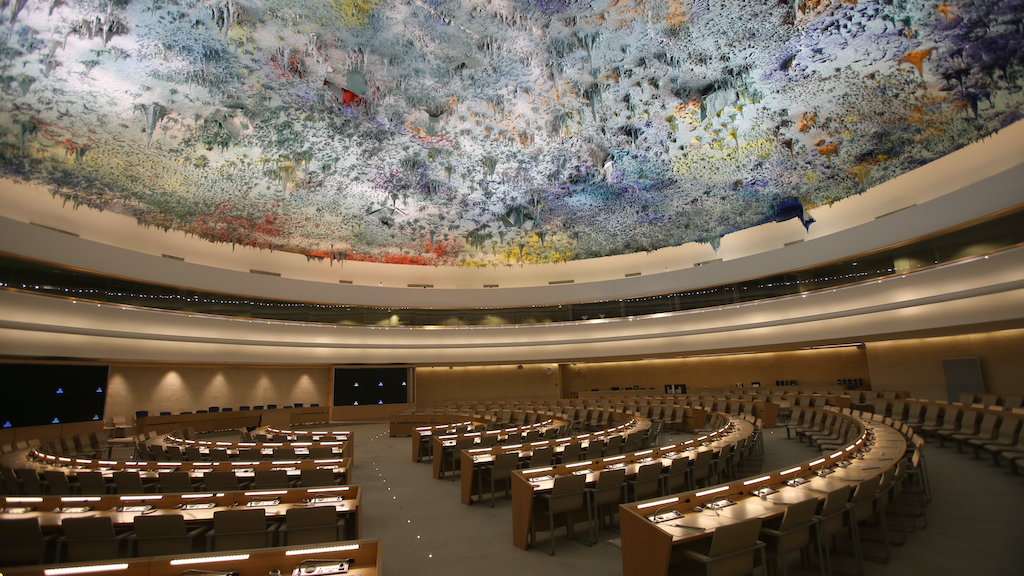Growing international criticism of UN Human Rights Council’s one-sided historical and legal narrative
On 13th June 2022, in Geneva, 22 UN member states (coordinated by the United States) signed a statement to the UN Human Rights Council (UNHRC) expressing strong legal and policy concerns with the establishment in 2021 of the Council’s Commission of Inquiry (COI) into Israel and the Occupied Palestinian Territories. The occasion was the COI’s presentation of its first report to the Council.
Austria, Germany and Netherlands were among one of the European signatories of this statement.
The fact that so many countries felt the need to make such a statement reflects a deep problem with the UNHRC, and the modern human rights movement in general.
One-sided historical narrative
In its report, the COI relies on the one-sided condemnations of Israel by UN bodies over the years to conclude that the Israeli occupation is the main cause of the tensions in the region and calls on urgent action to “end the occupation”.
The report ignores the history of the region prior to 1967, and undermines Israel’s legitimate rights to secure borders and protect its territorial integrity. It downplays Palestinian terror, portrays Israel as a rogue state, and seems to be intended to lay foundations for allegations of apartheid and other international law crimes to be submitted to the International Criminal Court.
Concerns
The statement made by the US and other nations on 13th June reflects a growing international concern with this one-sided way in which the UNHRC and many human rights organisations approach the Israel-Palestinian conflict.
“No one is above scrutiny”, says the statement, but “the nature of the COI established last May is further demonstration of long-standing, disproportionate attention given to Israel in the Council and must stop. We continue to believe that this long-standing disproportionate scrutiny should end, and that the Council should address all human rights concerns, regardless of country, in an even-handed manner. Regrettably, we are concerned that the Commission of Inquiry will further contribute to the polarization of a situation about which so many of us are concerned.”
The concerns expressed in this statement should be taken very seriously.
Israel is not perfect. But it has a right to be a Jewish State, and sovereign claims to the territories. The Palestinians also share responsibility for their plight. The only way to resolve this conflict is through negotiations.
By relying solely on the Palestinian narrative of history, the UNHRC (and other human rights organisations like Amnesty International and Human Rights Watch) ignores many of the underlying causes of the conflict. This will not promote peace, but only result in deepening the conflict.
A new approach is needed – one based on historical realities and mutual respect. The UNHRC’s obsession with criticizing Israel must be abandoned.
Background
In 2021 the UN Human Rights Council (UNHRC) established its open-ended Commission of Inquiry into Israel and the Occupied Palestinian Territory (OPT). This Commission of Inquiry (COI) is highly problematic from an international law perspective and should never have been established.
On 7th June 2022, the COI published its first report. As expected, it is one-sided and biased, its conclusions based on factual and legal inaccuracies, reflecting the biased mandate.
The COI relies on the one-sided condemnations of Israel by UN bodies over the years to conclude that the Israeli occupation is the main cause of the tensions in the region and calls on urgent action to “end the occupation”.
The report ignores the history of the region, and undermines Israel’s legitimate rights to secure borders and protect its territorial integrity. It downplays Palestinian terror, portrays Israel as a rogue state, and seems to be intended to lay foundations for allegations of apartheid and other international law crimes to be submitted to the International Criminal Court.
In addition to the factual distortions and inaccuracies, the report’s conclusion that the occupation is the main root cause of the conflict is based on a fundamentally flawed legal analysis. Basically, the COI adopts the legal paradigm that the Palestinians have a right to a State and that Israel has no rights whatsoever to control the territories it captured during the 1967 Six-Day war (the Old City of Jerusalem and its environs, and Judea and Samaria). Israel is a “mere” occupying power and must end its occupation of Palestinian territory.
This is a totally false historical and legal narrative. The fact is that Jerusalem, as well as Judea and Samaria (which later became known as the “West Bank of the Kingdom of Jordan”), were always intended to be part of the Jewish homeland in Palestine that the international community decided to be established after WWI. After WWI, even though the Jews and other minorities were an important part of the geographical landscape of the former Ottoman Empire, the Arabs received sovereignty over all of the Middle East, with the exception of the territory then known as “Palestine”, where the Jewish people were to be allowed to establish their homeland, owing to their unique historical connection with the land.
The only reason the Jewish homeland does not include the whole of Jerusalem, Judea, and Samaria is because of the Arab aggression against Israel intended to destroy the Jewish nation.
The Arabs could have established their own State in 1947, and on many subsequent occasions, next to the Jewish State, but have repeatedly chosen not to because they refuse to accept the existence of a Jewish State.
This is not a matter of legal technicality or mere assertion of historical rights. Israel’s very existence is at stake. Jerusalem, Judea and Samaria form the heartland of “Palestine”. If Israel’s sworn enemies gain full control of these mountains, they can destroy Israel with ease.
The COI ignores all of this. Instead, relying selectively on UN resolutions and reports, it chooses to accuse only Israel of alleged violations of international law.
Here are some examples of the COI’s imbalanced analysis:
- by focusing only on international humanitarian law, human rights law and criminal law, the COI ignores Israel’s territorial sovereignty over Jerusalem and its legal claims of sovereignty to Judea and Samaria: this is the heart of the matter, because those claims (which are perfectly valid) are the main basis upon which Israel is entitled to administer the territories, assert control and demand a peace treaty;
- the COI states that UN Security Council resolution 242 (1967) and international law require Israel to “end the occupation” and “withdraw”: this is false, because (apart from fact that 242 was non-binding) Israeli “withdrawal” was just one of the principles mentioned in 242;
- the COI regards the “State of Palestine” as existing, covering areas A, B and C: this is totally false because “Palestine” is not a state under international law (as even the ICC admits). Palestine cannot become a State under international law until an agreement is reached with Israel;
- the COI implies that the Oslo Accords requires Area C to be “handed over” to the Palestinians – this is misleading, and ignores the many terms and conditions of the Oslo agreements, which required many conditions to be fulfilled before Israel would “hand over” Area C;
- the COI ignores the PLO/PA’s blatant breaches of the Oslo agreements since the mid 1990s, including their refusal to amend the Palestine State National Charter to remove the clauses calling for jihad to destroy the Jewish State of Israel.





